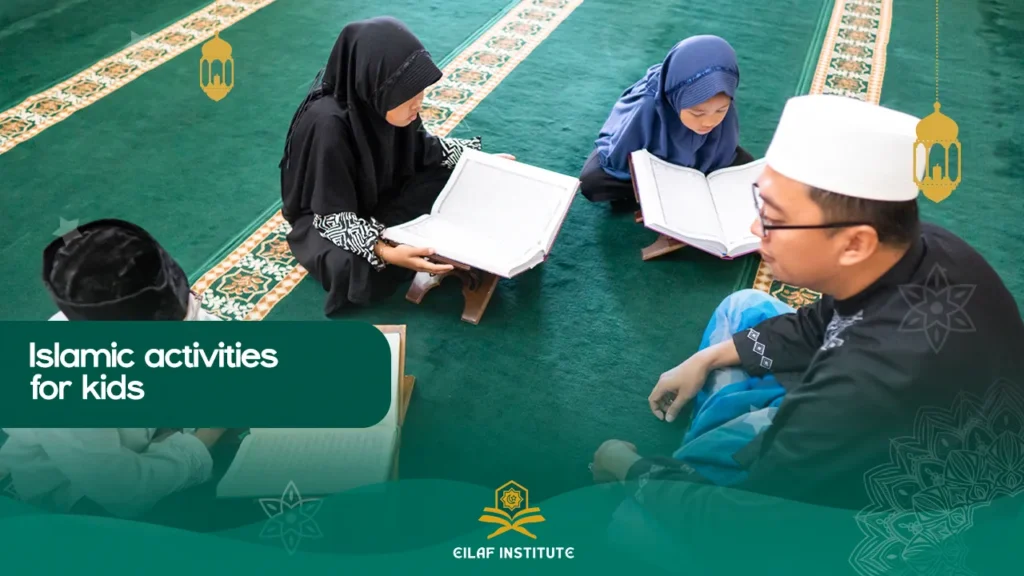Islamic activities for kids are a great way to help them learn more about their religion while having fun. Children should be introduced to Islam in ways that differ from traditional adult learning methods.
They need engaging and entertaining approaches to make the learning process enjoyable and effective.
This article provides parents with a variety of activities that can help their children explore and understand their faith without feeling bored.
Islamic Activities for Kids
Introducing children to Islam through enjoyable and meaningful experiences helps nurture a strong connection with their faith from a young age.
Whether you’re a parent, teacher, or caregiver looking for Islamic activities for kids, the ideas below combine learning with fun, making Islamic education both memorable and engaging.
1. Singing Nasheeds
Singing Islamic nasheeds is a wonderful way to introduce Islamic teachings for kids in a joyful and engaging manner. This method helps children memorize phrases, values, and concepts while developing a love for their religion. Nasheeds often include themes of kindness, gratitude, and praising Allah , making them ideal for young learners.
Why it works: It transforms memorization into a rhythmic, fun Islamic activity that strengthens emotional and spiritual bonds.
2. Quranic Learning Games
If you’re wondering where do I learn about Islam in a fun way, look no further than interactive Islamic games for children. Try creating a card game where each card asks a question about the life of the Prophet (PBUH), Islamic history, or Quranic stories. The back of the card can include the answer with a short explanation.
Pro Tip: Use this format in classrooms as Islamic games for students, or at home to encourage daily learning habits.
3. Quran Recitation Practice
Encourage your child to learn and recite the Quran with proper Tajweed. This sacred practice isn’t just about reading, it’s about correct pronunciation, rhythm, and understanding. This is one of the most powerful Islamic educational activities for kids, as it fosters a deeper spiritual connection.
Bonus Activity: Hold a mini-recitation competition among siblings or classmates to make it interactive and confidence-building.
4. Charity and Community Service
One of the most beautiful Islamic values is charity (Sadaqah). Engaging your kids in small charity projects, like packing food for the needy or donating toys, teaches them generosity, empathy, and gratitude.
Islamic knowledge for kid isn’t just about facts; it’s about living Islamic principles. These acts of kindness are true Islamic activities in practice.
Book your place now at our islamic studies courses
5. Reading Islamic Stories
Reading books about the lives of the Prophets, the Sahabah (companions), or inspirational figures in Islamic history helps kids learn morals like honesty, bravery, and humility. This is a great way to blend Islamic entertainment for kids with moral education.
Tip: Choose age-appropriate stories and discuss what your child learned after reading.
6. Create a 99 Names of Allah Tree
Turn theology into a fun craft project! Let children create a decorative tree and add a new leaf each day with one of Allah’s names and its meaning. This is a deeply spiritual and interactive Islamic game for children that builds both knowledge and emotional connection.
It is one of the best Islamic activities for kids.
Goal: Help children understand who Allah is beyond just memorization, His mercy, wisdom, and justice.
7. Arabic Alphabet Bingo Cards
Turn language learning into play by using Arabic Alphabet Bingo! This is one of the best Islamic educational activities for kids that strengthens their foundation for reading the Quran.
Bonus: Add small Quranic words or phrases in advanced levels to challenge older kids.
8. Cooking Halal Meals Together
Teach children the concept of Halal and Haram by letting them help in the kitchen. Introduce them to famous Islamic dishes and the Sunnah of the Prophet Muhammad (PBUH) regarding food and healthy eating habits.
Interactive idea: Host a “Halal Cooking Day” where kids cook, learn, and present what they’ve made to family or friends.
9. Islamic Quiz Night or Kahoot!
Organize a weekly Islamic knowledge quiz using apps like Kahoot or printable trivia. These Islamic games for students can include questions about prophets, Islamic months, prayer times, or etiquette (Adab).
Why it’s fun: It encourages healthy competition while reinforcing important concepts.
Read also about : how to teach islam to child
Ideas Of Fun Islamic Activities For Kids
1- Quranic Word Search
- Create a word search using words from the Quran or related to Islamic teachings. This can help children recognize important terms and their meanings while having fun.
2- Islamic Trivia Quiz
- Organize a fun trivia quiz with questions about the life of the Prophet Muhammad (peace be upon him), the companions, the pillars of Islam, and important Islamic events. This can be done in teams for a more engaging experience.
3- Islamic Story Time
- Read and discuss stories from the Quran or about the Prophet’s life. After reading, ask kids to retell the story or draw pictures related to it. This helps with both comprehension and creativity.
4- DIY Islamic Crafts
- Organize craft sessions where kids can create Islamic-themed art. They can make prayer mats, decorate Quran covers, create Ramadan lanterns, or make Islamic calligraphy posters.
5- Learning Dua with a Song
- Turn Islamic duas into fun songs or rhymes that kids can sing along to. This can help them memorize important supplications (duas) in a fun and interactive way.
Join EILAF Institute and book our islamic studies courses
At EILAF Institute, we believe in making learning about Islam both fun and engaging for children. Our carefully designed activities help your kids grow spiritually and morally while enjoying the learning process.
Whether it’s through singing Nashids, playing educational games, or practicing Quranic recitation, your child will develop a deeper connection with their faith.

